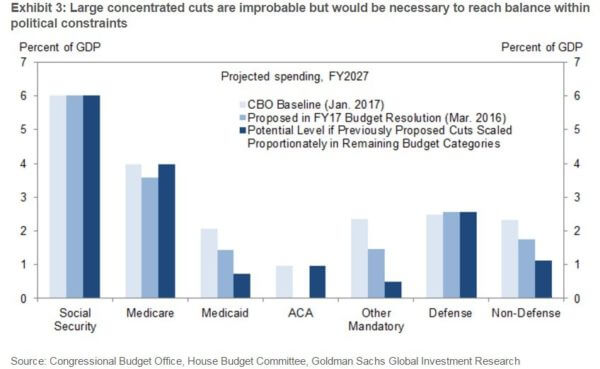Ricochet is the best place on the internet to discuss the issues of the day, either through commenting on posts or writing your own for our active and dynamic community in a fully moderated environment. In addition, the Ricochet Audio Network offers over 50 original podcasts with new episodes released every day.
 This Chart Shows Just How Hard a Balanced Budget Will Be
This Chart Shows Just How Hard a Balanced Budget Will Be
As a candidate, Donald Trump said he favored a balanced budget “relatively soon.” Then again, he also said, “I love debt. I love playing with it.” Just how much Trump loves or hates federal debt will be revealed in the coming months. Congress, too. Congressional Republicans have typically offered annual budget resolutions that would eliminate the budget deficit within a decade by reducing spending growth.
The same this time around? Goldman Sachs raises some issues:
Three factors will make this year’s budget plans even more difficult to put together. First, the projected deficit at the end of the ten-year period that Congress uses for fiscal plans is slightly larger. Second, Republican leaders will need to make room in the budget for tax reform and increased infrastructure spending, unlike previous budget proposals. Third, more of the budget appears to be politically off-limits to proposed cuts than in the past.
This chart illustrates the difficulty of the task, followed by explanation (italics mine):

Exhibit 3 presents a scenario in which Medicare is considered off-limits, savings from the ACA are not counted because they would need to be redirected into new benefits for those currently covered, and defense spending is kept at the same slightly increased level as last year’s proposal, and cuts in the remaining areas are scaled up proportionately to achieve balance while covering the cost of the tax cuts and infrastructure spending.
The upshot is that Medicaid, non-defense “discretionary” spending (funds appropriated by Congress for purposes other than defense) and other “mandatory” spending (income support programs, federal and military pensions, and veterans’ benefits) would need to be cut by between 50-80% to achieve a balanced budget within the next ten years. We are skeptical that a budget resolution that proposes cuts of this size could win the 51 votes necessary to pass in the Senate.
Some options here: First, abandon the balanced budget goal. Second, put entitlement reform back on the table, even though Trump has dimissed it. Goldman: “…it is difficult to see how congressional Republicans will put together a credible budget proposal that achieves balance within ten years without proposing changes in this area.” Third, scale back tax cuts. Is there a door number four?
Published in Economics



How about selling off some government lands in the West. Environomentalists will scream, but they won’t like Trump regardless of what he does. It would raise money and the lands would become more productive.
The important goal should be to reduce spending, gut the regulatory regime and simplify the tax code while reducing the perverse incentives that work against savings and investment. While entitlements cannot be ignored, they do not have to be cut because of imbalance. What matters is spending and how we go about paying for it because that is what does the harm, uses resources poorly or creates perverse incentives. Very few folks care about or are willing to sort this stuff out so that balance matters because it is something even our Congress can understand.
At this point, any analysis of the budget has to be focused on debt service and the relationship between the growth needed to support a given tax revenue and the effect that growth has on interest rates.
If you hypothesize massive private sector growth that would ordinarily generate sufficient revenue to balance a budget, you must consider that interest rates on federal debt must rise to compete. That interest rate increase increases debt service. The debt service increase may make the balanced budget impossible. Thus, the massive growth seems unlikely to be possible.
from a previous thread On the Necessity of Federal Lands:
Jack Byrne took over as CEO of GEICO when they were on the verge of bankruptcy. He was told that certain costs were fixed such as the Board of Directors. So he slashed it from 15 to 9 people. Given the perilous state of US finances, it’s time to cut some supposed fixed costs.
Door number four is to make a serious attack on corporate welfare. You will then find that some other doors open behind it.